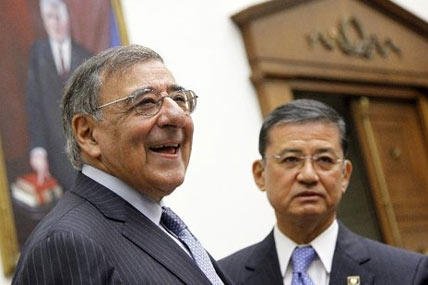Members of the House Armed Services and Veterans Affairs committees found their own oft-voiced opposition to possible sequestration cuts echoed in the testimony of the Obama administration's Defense Secretary today during a joint meeting of the committees.
"I sure as hell hope sequestration doesn't happen," Leon Panetta told the lawmakers, which drew a quick "I'm with you" from Rep. Buck McKeon, chairman of the Armed Services Committee.
As Republican and Democrat lawmakers continue to disagree over the proposed 2013 defense budget, there is growing concern that the automatic, across-the-board cuts Congress mandated a year ago -- as a way to force themselves to make tough spending decisions -- will actually occur.
"It would be a disaster in terms of the Defense Department," Panetta said. "As far as our budget is concerned, as far as our ability to respond to the threats that are out there, it has a big impact."
The administration's budget calls for just under $500 billion in Defense spending over the next 10 years. Sequestration, if it kicks in come January, will add another $500 billion in cuts over the coming decade.
Among other things, it would mean drawing down the force by an additional 100,000 people, according to Panetta.
"We can handle what we proposed in our budget … but sequestration will really strain the system," Panetta said.
As For the Department of Veterans Affairs, which was given an exemption from any sequestration cuts, Secretary Eric Shinseki told a somewhat surprised committee that departmental administrative costs would still be subject to mandatory cuts.
Rep. Jeff Miller, chairman of the House Veterans Affairs Committee, asked Shinseki to report back to the lawmakers on just what that may mean for the department.
In what several lawmakers observed was an historic session -- having both the secretaries of Defense and the Department of Veterans Affairs together to testify -- much of the two-hour-plus meeting was spent asking the same questions that the committees had previously asked the witnesses in previous hearings.
The legislators asked again about the backlog in veterans awaiting decisions on disability compensation, on why the VA and Defense Department have not yet developed an integrated system for evaluating separating troops and veterans, and what they were doing to ensure vets were prepared to rejoin the civilian world.
Panetta explained that the two departments had developed their systems for evaluating servicemembers over many years, and change was slow to come because both departments showed resistance to change.
Shinseki also said that the backlog in the VA system was of the department's own making, by expanding the list of illnesses related to exposure to Agent Orange during the Vietnam War and illnesses linked to service in the Persian Gulf during Operation Desert Shield and Desert Storm.
All together, he said, these decisions added more than 700,000 veterans to the system.
But Shinseki told the lawmakers the VA made the right decision in each case because the country owed it to those who served to get them the care they needed.



























